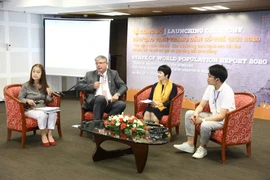Hanoi (VNA) - The Ministry of Labour, Invalids and Social Affairs andthe UN Population Fund (UNFPA) co-hosted an event on September 24 to releasethe independent Review of Ten Years of Implementing the Law on Gender Equality.
In herremarks, Deputy Minister of Labour, Invalids and Social Affairs Nguyen Thi Hasaid Vietnam has seen encouraging progress in promoting gender equality, withpositive changes in attitudes and behaviours among power holders, civilservants and citizens, contributing to heightening the role and position ofwomen in the family and society.
Ha, whois also Standing Vice Chairperson of the National Committee for the Advancementof Women in Vietnam, noted that the country has been recognised by the internationalcommunity for its efforts in gender equality, adding that the enforcement ofthe law, however, still faces various challenges.
Both menand women actually suffer the impact of gender inequality but women and girlsare the most vulnerable, she noted.
Thedeputy minister went on to say that the review provides realistic comments andassessments about the Law on Gender Equality, which should be revised andamended in the time to come.
UNFPARepresentative Naomi Kitahara said that, over the past decade, Vietnam has countedamong Asia-Pacific nations achieving progress in gender equality, with the mostconsiderable move seen in advancing women’s rights and empowerment in the areasof healthcare and education through improving the legal framework andinstitutions.
Genderequality, one of the 17 Sustainable Development Goals, is not only a basichuman right but also fundamental to a peaceful and prosperous society inVietnam, she said.
The reviewwas conducted from June 2018 to June 2019 and focuses on an assessment of theLaw on Gender Equality’s consistency in relation to international human rightsstandards and other Vietnamese laws and the effectiveness of the implementationof the law by those responsible since it came into effect in 2007. It alsoidentifies key gaps to inform the revision of the law and ensure betterimplementation and provides recommendations for amendments and supplementation.
Thereport reveals that in the National Assembly (NA) elections for the 2016-2021term, 26.8 percent of representatives elected were women, compared to theaverage of 19 percent in Asia and 25 percent globally./.






























